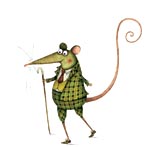Country mouse on jays
Jays should be celebrated for the trees they plant every year instead of persecuted, argues Mark


Two trees dominate the view from our kitchen: an ash and an oak. The ash has already lost all of its leaves like the oak, it is the last of our natives to burst into leaf in spring, but, remarkably, is always the first to shed them. Our oak is attracting huge numbers of pigeons which feed on the fallen acorns, as do a pair of jays. I adore jays. They have often been called, not unfairly, Britain's bird of paradise with their pink bodies, black moustache, white rump and, of course, their striking azure and black primary feathers.
Jays bury the acorns up to 100 a day memorising their location for future use in the spring. A remarkable feat from one of the world's most intelligent birds, but they do not remember them all and, in forgetting the odd few, are responsible for the planting of thousands of oak trees a year.
The jay, however, does have a darker side; it occasionally takes eggs and kills small birds, but is nothing compared to the magpie. Perhaps, in the age of global warming, countrymen should stop persecuting this delightful bird and celebrate it for the trees it plants.
Exquisite houses, the beauty of Nature, and how to get the most from your life, straight to your inbox.
Country Life is unlike any other magazine: the only glossy weekly on the newsstand and the only magazine that has been guest-edited by His Majesty The King not once, but twice. It is a celebration of modern rural life and all its diverse joys and pleasures — that was first published in Queen Victoria's Diamond Jubilee year. Our eclectic mixture of witty and informative content — from the most up-to-date property news and commentary and a coveted glimpse inside some of the UK's best houses and gardens, to gardening, the arts and interior design, written by experts in their field — still cannot be found in print or online, anywhere else.
